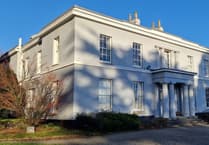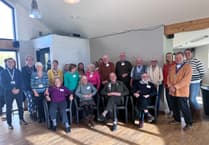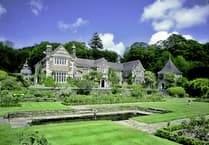THE IMPORTANT role of search and rescue teams including those on Dartmoor was the subject of a debate in the House of Lords last week.
Former MP for West Devon and Torridge Lord Burnett expressed gratitude to volunteers and stressed the need for the Government to ensure necessary resources were given for them to work safely and effectively.
The debate, raised by Lord Burnett on the contribution to public safety made by the Dartmoor Search and Rescue and Mountain Rescue England and Wales, followed a visit by Lord Burnett and minister Baroness Barran MBE to the headquarters of Dartmoor Search and Rescue Team (DSRT) Tavistock recently.
Addressing the House of Lords Lord Burnett, who is patron of the Tavistock team which celebrated its 50th anniversary last year, said: ‘I do not recall a previous debate on these matters, and it is time that we as a House, and the Government, had an opportunity to express our profound gratitude to all the volunteers — all of them unpaid — who serve in mountain rescue throughout England and Wales and the UK and their partners and families.
‘We as a society owe them a debt of honour and Parliament and the Government must ensure that they have the necessary resources for their operators to enable them to work safely and effectively. Only the best equipment and training will do. Volunteers and others spend a great deal of time fundraising and the public generally are supportive but more is needed as the demand increases.
‘2018 was one of the busiest years on record for many teams. It was not long ago when the busy teams in England and Wales were recording double-figure call-outs per year. In recent years, these numbers have increased to over 100 call-outs per year. In 2018, one team recorded 212 call-outs.
‘Mountain rescue volunteers drop what they are doing and go into the mountains or moorlands to help someone in difficulty, over and over again.’
He said in addition to mountain rescue work, volunteers assisted in events such as flooding, looking for missing persons and giving safety cover at events. The list increased annually and the equipment requirements to cover these different jobs added to the cost the teams had to bear.
He said voluntary rescue services were sustainable and they would continue to offer a free service to the people they rescued. This was part of the ethos and culture of mountain rescue and the people who worked in it.
He said team members visited schools, scouts and many other youth and adult organisations to explain their role and other matters, particularly the respect that should be paid to the mountains and moors.
‘On Dartmoor, for instance, when the mist comes down, even the most experienced and knowledgeable person is in danger,’ said Lord Burnett.
‘When the rain is pouring down, a small river can become a deadly torrent. It is in these dangerous circumstances, by day and by night and over long periods of time, that the volunteers in the teams give their time and risk their lives.
‘The whole House, I am sure, will join me in expressing the gratitude of all of us to all the members of the teams, their partners and their families for their dedication, courage, stamina, altruism and wholehearted commitment.’
Lord Astor of Hever (Con) said: ‘My first experience of Dartmoor goes back to the spring of 1966 when, as a young army officer cadet on our final training exercise, I spent a fortnight on the moor and experienced it at its most severe —snow, rain, fog and bitter cold.
‘A year later, two young officer cadets ran into trouble on Dartmoor. A rescue effort was attempted but difficult terrain and impending darkness, coupled with technical mishaps and human error, ultimately led to failure and the two young cadets, sadly, lost their lives.
‘As a result of that tragedy, the Dartmoor Rescue Group was founded and I pay tribute to it for its wonderful work.
‘Its members head off into the wind, the rain and the snow to help, among others, lost school groups, injured walkers, missing children and people with dementia. I have grown to respect their work. They are real lifesavers, and, as Lord Burnett, said, everybody involved is an unpaid volunteer.
Giving a response on behalf of the Government Baroness Barran said: ‘Her Majesty’s Government pay tribute to all our search and rescue teams across the UK and commend the important contribution that our dedicated search and rescue volunteers and full-time services make to the UK as a whole in rescuing and assisting the many thousands of people who get into difficulty in our wonderful mountains, lowlands, caves and around the beautiful coasts, cliffs and seas of the UK.
‘The UK is very fortunate to have around 170,000 dedicated search and rescue volunteers who, without expectation of reward, risk their lives daily to assist any person who is in need.
‘Our search and rescue services are recognised around the world...
‘We can all remember with pride the contribution made by UK cave rescue volunteers to the Thai cave incident in June and July last year, which resulted in the rescue of 12 schoolboys and their teacher in very difficult circumstances, with the world watching their every move.’
She said the UK search and rescue Libor training partnership was looking at opportunities to use some of the remaining funding to enhance longer-term fundraising opportunities and the Government was keeping this under close review.
‘I cannot promise Lord Burnett a meeting with the Treasury but I will undertake to make sure that details of this debate are shared with it,’ she said.
In terms of the role of drones and technology, the minister said both Her Majesty’s Coastguard and the RNLI were working together to consider the role of drones to increase the efficiency of search and rescue, obviously to save more lives but also to reduce risk to volunteers. Trials were being considered at the moment but search and rescue dogs were still absolutely crucial, she said.
Baroness Barran said it had been a great pleasure to respond for the Government in this important debate and to recognise not only the terrific work of Dartmoor Search and Rescue but all the search and rescue services and their combined contribution to public safety.
‘I am sure that the House will want to join me in paying tribute to all of them and their volunteers for their courage and skills to save lives in whatever environment,’ she concluded
Speaking after the debate chairman of DSRT Tavistock Rhodri Davey said he was grateful to Lord Burnett for raising the profile of the rescue teams on Dartmoor and across the country.
‘As patron of the DSRT Tavistock that gave Lord Burnett a platform to raise this debate and it is fantastic that it is being discussed at Govenment level,’ he said.
‘The points we wanted to raise were that all the work is done exclusively by volunteers and we need continued government support for training.
‘We have had some really high quality training from the Government from its Libor funding and we are keen to make sure that continues.’




